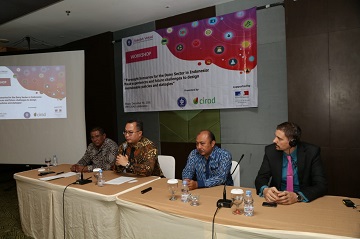In Spite of Old Age, Japanese Farmers Are Aware of Technology

Indonesia needs to be watchful about the aging population of farmers, which means farmers and fishermen are now dominated by aged workers. Japan also faces the same challenge, but it is always up to date with technology. Japan has modernized its agriculture.
“Despite old age, Japanese farmers are aware of technology, utilizing internet of things, Big Data analytic, drones, and sensors. Age is not an obstacle as long as they are still producing innovations. In Indonesia, the problem is mostly not about age, but the education level of the farmers,” said Dr. Arief Daryanto, Dean of Vocational School (SV) of Bogor Agricultural University (IPB) in Workshop Foresight Scenarios for the Dairy Sector in Indonesia: Past Experiences and Future Challenges to Design Sustainable Policies and Strategies held in IPB International Convention Center, Bogor (4/12).
This is where SV IPB plays a role, to produce young educated farmers and fishermen. For example, cattle farm and poultry are high-value commodities. High-value commodities also have high risk.
“We also have to expose students to comprehensive knowledge about how cattle farm is not only about production, but also have to pay attention to demand driven. From grass to glass. So, it has to be comprehensive,” said Dr. Arief.
About milk production in Indonesia, Dr. Arief Daryanto said that there are many strategies can be done to increase milk productivity. One of them is to increase population size. “We can only produce 20 percent from our needs and import the rest of it, so the population size of the cattle has to be increased. Aside from that, continuous supply of feed is another strategy to increase productivity, so planting of grass should be a priority. In dairy cattle farm business structure, 65 percent of production cost comes from the feed. So, the cheaper the feed, the cheaper the milk,” he explained.
Another important matter is the need of consolidation between mega farm and small scale farm about cattle, so a horizontal integration will be achieved. This consolidation opens up opportunities for small businesses to manage 50-100 cows to suppress production cost.
IPB Rector, Arif Satria, in his greeting, expressed his hope that national milk productivity can fulfill the need of society. The Rector also motivates for new businesses in this sector to emerge.
“Universities encourage new agriculture startups so that the businesses in this sector are not only consist of multinational companies, but also small players. These talents are the one that we produce in IPB Vocational School” he said.
During this workshop, which is a result of a collaboration between IPB, CIRAD and supported by France Embassy in Indonesia , it is known that IPB and CIRAD has established a research partnership at 2013 about the development of sustainable milk industry. According to this partnership, field researches have been done to further understand about the dynamics of cooperation in Indonesia’s commerce chain.
This collaboration also increases IPB academicians’ skills, proven with 2 master students and ! doctorate student who prevailed in defending their disertations in Montpellier (France). This is supported by Nicholas Gascoin from France Embassy’s statement about how France has several models that can be learnt from about dairy sector development in Indonesia. (dh/Zul)


